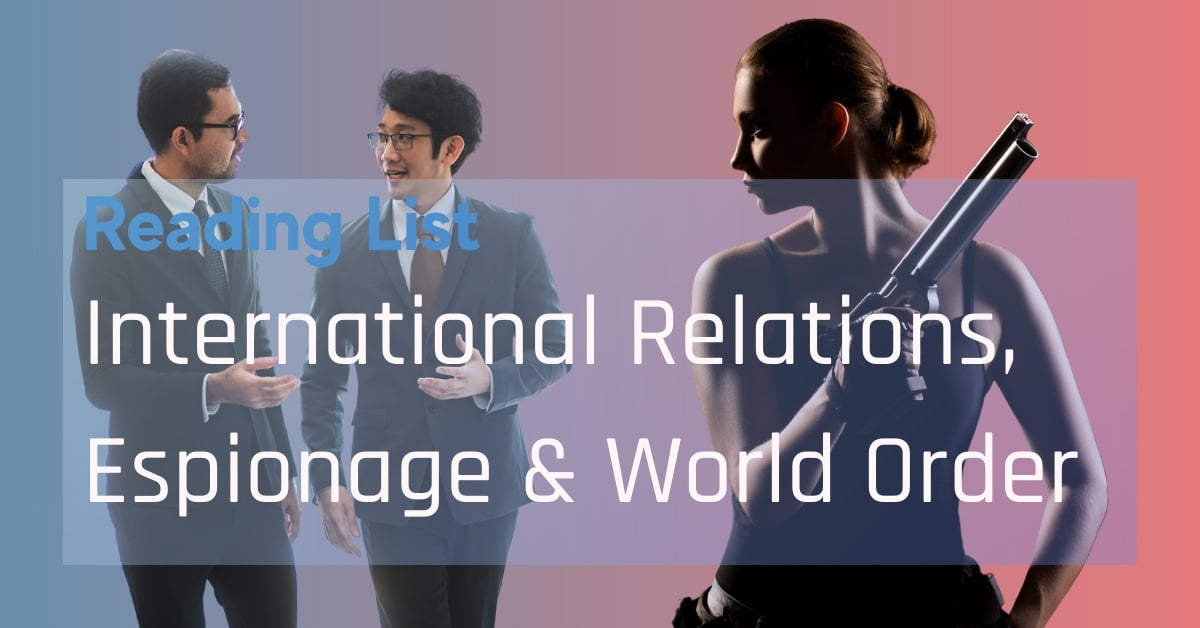Essential Reads: Books on International Relations, Espionage, and Intelligence Agencies’ Influence by Persons Who Have Been ‘Involved’
Understanding the complexities of international relations is crucial for gaining valuable insights into global politics, diplomacy, and intelligence. The field encompasses various interactions between nations, affecting the world on multiple levels. Whether analysing historical events, understanding current geopolitical dynamics, or predicting future global trends, delving into international relations is essential for comprehending the intricate web of global interactions and their impact on world affairs. Therefore, the following list features books authored by influential figures in the field, including state officials, diplomats, and intelligence professionals. These works offer unique perspectives on the inner workings of international relations, making them indispensable for anyone seeking to unravel the intricacies of global affairs.

- Diplomacy by Henry Kissinger: This comprehensive analysis of international relations, spanning centuries of history, offers a unique perspective from a former U.S. Secretary of State. Kissinger’s personal experiences and expertise, shared in this book, provide a credible exploration of the art of diplomacy and the balance of power. While the book may be dense and challenging, it is a must-read for those seeking a deeper understanding of global politics and the forces that shape our world, especially considering the unique insights offered by its author.
- The Tragedy of Great Power Politics by John Mearsheimer: John’s book presents a comprehensive and thought-provoking analysis of international relations, focusing on “offensive realism.” Mearsheimer argues that states seek to maximise their power and security, leading to a competitive and often aggressive pursuit of dominance in the international system. He delves into historical examples and theoretical frameworks to support his thesis, offering a realist perspective on the dynamics of global politics. Critics have praised the book for its ambitious scope and depth. In contrast, others have questioned the validity of its assumptions and the potential for peaceful coexistence among great powers. Overall, “The Tragedy of Great Power Politics” is a seminal work that challenges readers to reconsider their understanding of international relations and the forces that drive global conflict.
- Why Bharat Matters by S. Jaishankar: S Jaishankar’s book evaluates India’s role in the global landscape, offering a unique perspective on the nation’s foreign policy and evolving relationship with the world. Jaishankar, India’s External Affairs Minister, delves into the complexities of contemporary geopolitics, emphasising the need for India to reclaim its civilisational legacy and cement its international position through a blend of traditional values and modern diplomacy. The book has been praised for its insightful analysis of global challenges and opportunities and call to action for India to assert its place on the world stage. However, some critics argue that the book could benefit from a more balanced assessment of India’s historical and cultural narratives, particularly its use of the Ramayana as a lens for foreign policy. Overall, “Why Bharat Matters” is a valuable contribution to India’s role in the 21st century discourse.
- The Unending Game by Vikram Sood: Ready to immerse yourself in intelligence and espionage, offering a unique perspective from a former head of India’s Research and Analysis Wing (R&AW). The book covers a wide range of topics, from the history of intelligence to the challenges faced by intelligence agencies in the modern era of technology and communication. Sood’s personal experience and expertise provide valuable insights into the workings of intelligence agencies, both in India and globally. While some critics have noted that the book could benefit from a more balanced assessment of historical and cultural narratives, “The Unending Game” is generally praised for its depth and breadth, making it an essential read for anyone interested in understanding the complexities of intelligence and its role in global politics.
- The Naked Diplomat by Tom Fletcher: This book by the former British diplomat presents a unique perspective on diplomacy in the digital age, offering insights from his experiences as a former British ambassador to Lebanon. The book delves into the evolution of diplomacy in the face of technological advancements, emphasising the importance of direct engagement and the use of social media in modern statecraft. While some critics argue that the book’s focus on social media may oversimplify the complexities of diplomacy, others appreciate its fresh and engaging approach to the subject. Overall, “The Naked Diplomat” provides a thought-provoking analysis of the challenges and opportunities facing diplomats in the 21st century.
- The Anarchical Society by Headley Bull: This one by Hedley Bull is a seminal work in international relations, offering a comprehensive analysis of the nature of order in world politics. Bull explores the concept of global society and argues for an international system based on shared rules and institutions despite the absence of a hierarchical authority above sovereign states. The book has been praised for its depth and breadth, offering valuable insights into the complexities of global politics. However, some critics argue that it overlooks certain aspects of world politics and could benefit from a more balanced assessment of historical and cultural narratives. Despite these criticisms, “The Anarchical Society” remains a significant contribution to international relations, with its relevance continuing to be recognised in contemporary discussions on global order.
- The Future of Power by Joesh Nye: Nye’s prestigious book offers a comprehensive analysis of the evolving nature of power in the 21st century, focusing on the shift from traditional state-centric power dynamics to a more complex interplay of hard and soft power, as well as the rise of non-state actors and the impact of technology. Nye, a renowned international relations scholar, presents a thought-provoking and insightful perspective on the challenges and opportunities facing nations in an increasingly interconnected world. While some critics argue that the book could benefit from a more balanced assessment of historical and cultural narratives, “The Future of Power” by Joseph S. Nye Jr. remains a significant contribution to the field of international relations, offering valuable insights into the complexities of global power dynamics.
- The Ultimate Goal by Vikram Sood: Sood’s title presents a comprehensive analysis of the role of narratives in global politics and power dynamics. Sood, a former head of India’s external intelligence agency, delves into the strategies employed by nations to construct and control narratives, emphasising their significance in enhancing a country’s strength and position. The book provides insights into the influence of intelligence agencies, the media, and other powerful institutions in shaping perceptions and realities. While some critics argue that the book could benefit from a more balanced assessment of historical and cultural narratives, “The Ultimate Goal” remains a valuable contribution to the discourse on international relations and the complexities of global power dynamics.
- The Mitrokhin Archive II: The KGB and the World by Vasili Mitrokhin & Christopher Andrew: The KGB and the World” by Christopher Andrew and Vasili Mitrokhin offers a comprehensive and detailed account of the global operations and influence of the KGB during the Cold War era. The book is based on a vast collection of secret documents compiled by a former KGB archivist, Vasili Mitrokhin. It provides unprecedented insights into the KGB’s activities in Africa, Asia, Latin America, and the Middle East. It reveals the extent of the KGB’s penetration and manipulation in these regions, as well as the organisation’s efforts to shape global events in favour of the Soviet Union. While some critics argue that the book may oversimplify complex historical and cultural narratives, it remains valuable to understanding international relations and intelligence during the Cold War.
- The Secret World: A History of Intelligence by Christopher Andrew: Christopher Andrew unfolds the evolution of espionage and intelligence operations from ancient times. The book covers a wide range of topics, from the ancient Greeks and Romans to the modern era, highlighting the importance of intelligence in shaping global events. Andrew, a renowned intelligence historian, provides a detailed analysis of key events and figures in espionage, offering a unique perspective on the role of intelligence in international relations. While some critics argue that the book could benefit from a more balanced assessment of historical and cultural narratives, it remains a significant contribution to intelligence studies. It is essential reading for anyone interested in understanding the complexities of global politics.
Want more details?
Why Bharat Matters by S Jaishankar Book Review
The books listed offer a rare glimpse into the hidden world of diplomacy, intelligence, and covert operations, revealing how these elements shape international relations and global stability. They illuminate the complexities of diplomacy, the clandestine efforts of intelligence agencies, and the strategic objectives of covert missions. By reading these works, one gains a deeper understanding of the delicate balance diplomats maintain, the ethical dilemmas operatives face, and the critical role of intelligence in shaping policies. These books provide a comprehensive education on global interactions, fostering a sophisticated understanding and greater empathy for the forces shaping our world. Enjoy the journey into this concealed realm, where each page reveals the profound impact of these elements on the global order.
Thanks!
Ashish for Desi Readers
